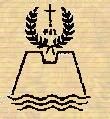|
FORGIVENESS
FROM GOD FOR OUR SINS (Matthew 18:21-35)
The parable shows the condition by
which we can have our sins forgiven. Christ says we must forgive
seventy times seven times--His way of saying “forever.” Then
Christ gives this parable to illustrate why it should be so: A king
settled his accounts with one of his officials who owed him a huge
amount. Unable to pay, the official and his entire family was to be
punished. But the official begged for a postponement of payment.
Moved with pity, the king not only allowed him a postponement of
payment but completely liquidated his debts.
Then, a fellow servant who owed the official a small amount begged
for a postponement, too. But the merciless official had him
punished. Hearing what his official had done, the king called the
official and had all his debts restored and gave him over to the
torturers. Then Christ warns us, “My heavenly Father will treat
you in exactly the same way unless each of you forgives his brother
from his heart.”
The official symbolizes us who have sinned grievously against God
and are completely unable to make up for our sins. God not only
gives us an extension for our debt-payment but completely erases our
debts, i.e., if, like the official, we begged humbly for
forgiveness. But the forgiveness God has given us is conditional, in
that, it only becomes permanent if we forgive others.
The fellow servant symbolizes those around us who have sinned
against us. There are two kinds of sins: sins against God, of which
only God can forgive, like adultery, and there are sins against man.
We are to forgive sins against man only. We cannot forgive sins
against God. So the sin of adultery, though the spouse had forgiven
her spouse a hundred times, can only be forgiven by God. In the
parable, we must forgive all sins man committed against us…if,
like the fellow servant, they ask for forgiveness. If our enemies
don’t ask for forgiveness, we must still forgive them in our
hearts but must not show it externally, since they might think that
they have already repented. From the parable, we must forgive all
sins committed against man if the sinner, like the fellow servant in
the parable, asks for forgiveness.
If we are not able to forgive sins against man committed against us,
how can we ask God to forgive our sins against God…which are more
serious. Just like the king in the parable, God threatens us that if
we cannot forgive the small debts of our neighbors, He will restore
all our former debts (i.e. the guilt of all our former sins that
seemingly had been forgiven) and will again demand payment for all
our previous sins…which will be impossible for us to pay. This is
condemning us to a life of punishment in hell. In short, we will
find ourselves with all our previous sins back in our souls. The
parable is clear on this. The king demanded back the debt which he
had forgiven the official.
Then Christ, ends by saying: you have to do exactly the same thing
if you must have your sins forgiven. Forgive us our sins as we
forgive those who have sinned against us… (not those who have
sinned against God). Sirach says: Wrath and anger are hateful things
yet the sinner hugs them. The Lord will remember the sins of the
vengeful. Forgive your neighbor’s sins so when you pray, your sins
will be forgiven. Hate not your neighbors and overlook their faults.
(10-18-02) |
